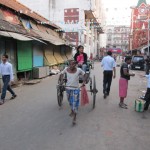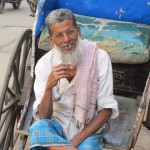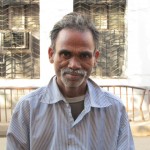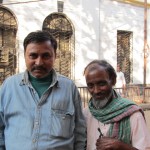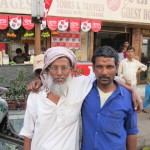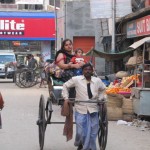When the Communists came to power in China, one of their first acts was to abolish the hand-pulled rickshaw. What an irony that in the second decade of the 21st century, the Communist leaders in West Bengal wait for the remaining rickshaw-pullers to die!
— A.J. Philip ((“West Bengal’s rickshaw era,” Herald of India.))
The Esplanade district is a large commercial area in the heart of Kolkata, India. On a warm February day while heading toward the markets on Lindsay Street, I observed a pair of rickshaw pullers hauling their human cargo along at a brisk trot.
One block over on Sudder Road, where most of the backpackers hang out, sat a wiry bare-foot man wearing a lungi (skirt) and a gumcha (cloth) wrapped around his head. His name is Mohammad Salim. He is a 62-year-old husband and father of six children from Bihar, in the north of India, and he is one of the last rickshaw pullers.
Kolkata is the last place in the world where people earn a living at as what some describe as “human beasts of burden.”
Salim was eager to be interviewed about his job, and his colleague, Mohammad Raju, 35, married with four children, joined in.
During this time of year (February when the interview took place), they said they earned about 100 to 200 Rupees a day ($1C=50 Rupees); on a really good day, they earned 300 Rupees. It costs about 100 Rupees a day to eat, and one can imagine that these men burn many calories a day transporting people and their goods hither and thither.
Rickshaw pulling is a male-only occupation. The pullers laughed when I asked whether a woman might do such work. “It is too dangerous,” they said, not mentioning any physical limitations.
They said their customers are both Indians and tourists. Depending on the trip, they usually charged the Indians about 20 Rupees and the tourists 30-40 Rupees. The price was per trip and not per number of passengers.
It was not uncommon to see two corpulent passengers with many bags of goods being trotted home by the lean rickshaw pullers — like scenes straight out of Aravind Adiga’s, The White Tiger: “thin stick men, leaning forward … bearing a pyramid of middle-class flesh – some fat man with his fat wife and all their shopping bags and groceries.” ((Aravind Adiga, The White Tiger (Noida, India: Harper-Collins, 2009): 27.))
The rickshaw has two large wheels and between there is a simple seat with low backing, about a meter above the ground, where the customers seat themselves with their bags. The rickshaw puller lifts the vehicle by means of two parallel poles an arm’s width apart. Most of the pullers rent their rickshaws. Sadar Ali, 44, from Bargona, Sundarban, is the father of three boys and one girl. He said he rents his rickshaw for 25 Rupees a day from the Salvation Army.
More rickshaw pullers joined our group. They were very forthcoming about the details of their livelihood.
One newcomer, Mohammad Edad, the 58-year-old father of four, told of his longest trips being about 10 kilometers, for which he received about 100-150 Rupees.
Sixty-year-old Firoj from Lashmikantpor said sometimes the bags of passengers would be 20 kilograms.
Because these rickshaw pullers were Muslim, they worked Saturday to Thursday, taking Fridays off. They said the rickshaw pullers were about half Muslim, half Hindus, adding that they all got along well.
Generally, they said other traffic was respectful to the rickshaw pullers, and they plied their trade in the narrow lanes where vehicles have more difficulty maneuvering. The main competition was from the Ambassador taxis.
They said that they would stop pulling a rickshaw if another kind of job was available, but that they were content.
Salim said, “Money makes happy. The only business is money. [I] do it for the money.”
Raju is from Kolkata, where he lives with his family. Salim stays in Kolkata for 4 to 5 months, and then he heads back north to his family in Bihar during the low season.
The best season for working, they all agreed, was monsoon season. Then the streets are flooded; it is difficult to walk, and cars cannot drive. They indicated by sweeping their hand with palm in-turned that the water level was up to their hips. During this season, they said they made 1000 Rupees a day.
The push is to eliminate rickshaw pulling from the last place on the planet. Without them, however, other jobs will need to be provided for Salim, Raju, and their colleagues, and during monsoon season, people will have to find another way to get to where they are going.
- On Bertram Street
- Mohammad Salim
- Mohammad Edad
- Sadar Ali and Firoj
- Mohammad Salim and Mohammad Raju
- All photos by kim, February 2012











